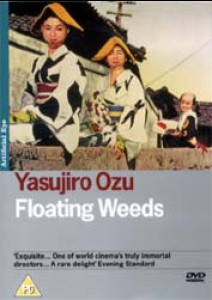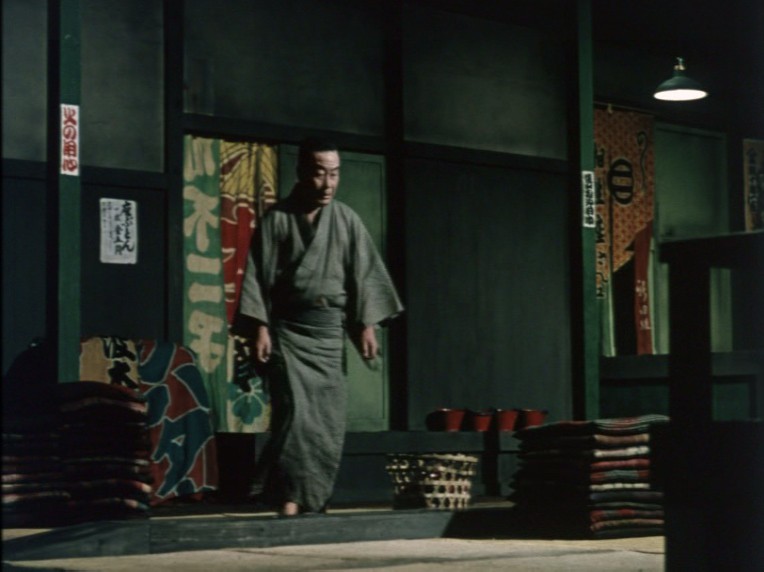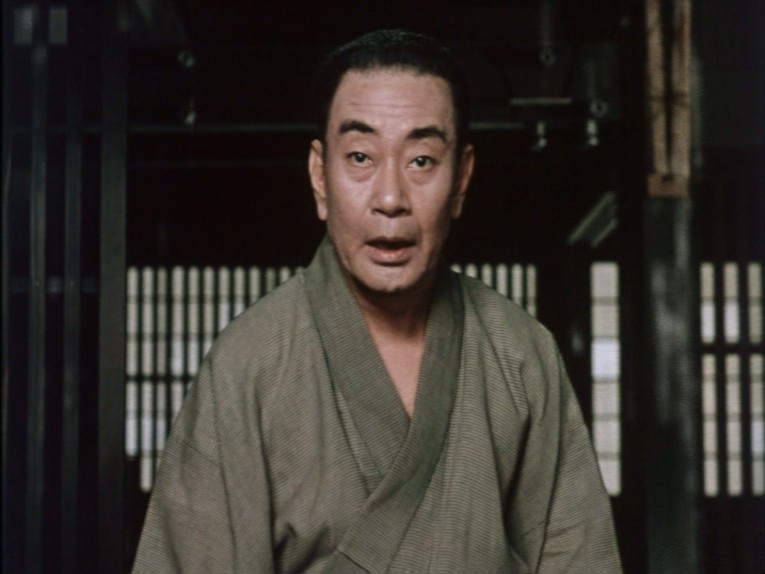|
Firstly, a massive thank you to our Patreon supporters. These supporters have become the single biggest contributing factor to the survival of DVDBeaver. Your assistance is essential to our survival.
What do Patrons receive, that you don't?
1)
Our
weekly
Newsletter
and
Calendar Updates
sent to your Inbox!
Please consider keeping us in existence with a couple of dollars or more each month (your pocket change! / a coffee!) so we can continue to do our best in giving you timely, thorough reviews, calendar updates and detailed comparisons. I am indebted to your generosity. |
![]()
![]()

![]()
![]()
|
Search DVDBeaver |
S E A R C H D V D B e a v e r |
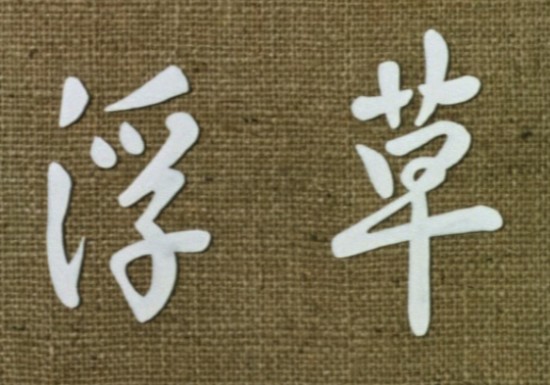
(aka "Ukigusa" or "Drifting Weeds" or "Floating Weeds")
The 2024 Criterion
Blu-ray package of A Story of Floating Weeds (1934) andFloating Weeds (1959) is reviewed / compared HERE
|
"Subtle, lyrical, and delicately
bittersweet, Floating Weeds is a remake of a story Ozu first told in a 1934
silent film (The Story of Floating Weeds). Floating Weeds (1959) stands a bit
apart from the bulk of Ozu's work, which primarily dealt with the middle-class
mainstream. But his favorite theme of the stresses and strains of parent-child
relationships figure prominently in this story of a raggle-taggle theater
troupe giving its final performances in a small fishing village.
Given the scenario, most filmmakers would chart
it out as a simple series of melodramatic "highs" and
"lows." Not Ozu. From the first shot, comically juxtaposing a
lighthouse (background) with a sake bottle (foreground), to the last one of a
train swiftly moving over a nighttime landscape, it's plain we're in the hands
of a filmmaker whose prime concern is understatement and overtone. Rather than
rush to the heat of a "big" dramatic moment, Ozu concentrates on the
warmth of "small" ones. In scene after scene the way the characters
walk, sit, stand, and speak is scrupulously observed. Time and time again, he
gives the screen over to "minor" characters (the secondary actors in
the troupe, always on the prowl for women) and even "unimportant"
ones (passers-by, old people, children).
Nothing is "unimportant" in Ozu's
view. The story is not meant to stand as an "exceptional" dramatic
incident, but rather as part of the context of the ebb and flow of life.
"Unimportant" people and actions are part of this ebb and flow. In
fact, so are the places and inanimate objects surrounding them. And so we are
treated to lovingly photographed shots of banners blowing in the wind, gardens
dripping with rain, empty small town streets. They punctuate the action,
signaling the beginnings and ends of scenes. But they are also there to be
seen for themselves in a manner that can only be called poetic. Ozu in
Floating Weeds tells us a story, but at the same time he brings it to us
through a child's eyes. We cannot ask more of a film
artist."
--
an excerpt from the old Criterion Laserdisc
notes by David Ehrenstein
|
Poster
 |
Theatrical Release: November 17th, 1959 - Japan
Reviews More Reviews DVD Reviews
DVD Review: Artificial Eye - Region 2 - PAL
| DVD Box Cover |
|
CLICK to order from: |
| Distribution | Artificial Eye Film Company Ltd - Region 2- PAL | |
| Runtime | 1:53:58 | |
| Video | 1.33:1
Original Aspect Ratio PAL 720x576 25.00 f/s |
|
| Audio | Japanese (Dolby Digital 2.0 Mono) | |
| Subtitles | English, None | |
| Features |
Release Information: Edition Details: None |
|
| Comments: |
The 2024 Criterion Blu-ray package of A Story of Floating Weeds (1934) andFloating Weeds (1959) is reviewed / compared HERE "This disc looks really, really nice. The colours are rich but not oversaturated like some VHS and cinema prints I've seen of this film - which probably overstated the beautifully luminous Kazuo Miyagawa cinematography (I believe this was the only time that Miyagawa worked with Ozu). I have a niggling feeling that the image is slightly cropped. Ozu's tight frames look slightly more zoomed in to me than usual and people look too thin. I will be very interested to see a comparison of this disc with the Criterion version which is due in 2004 (along with THE STORY OF FLOATING WEEDS in a 2 x disc set). For those that can wait, wait for Criterion. For those that can't - this Artificial Eye DVD is better than any of the Panorama Ozu discs from Hong Kong." The subtitles on this Artificial Eye release are in perfect English (unlike the appalling mess on some of the Panorama discs). Furthermore, it's unlikely that Panorama will be releasing FLOATING WEEDS because it was made by Daiei, and everything that Panorama are releasing is Shochiku." |
Recommended Reading for Japanese Film Fans (CLICK COVERS or TITLES for more information)
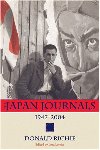 |
 |
 |
 |
 |
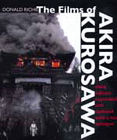 |
 |
 |
 |
|
The Japan Journals : 1947-2004, by Donald Richie |
The Midnight Eye Guide to New Japanese Film by Tom Mes and Jasper Sharp |
Kon Ichikawa (Cinematheque Ontario Monographs) by James Quandt, Cinematheque Ontario |
Shohei Imamura (Cinematheque
Ontario Monographs, No. 1) by James Quandt |
Eros Plus Massacre: An
Introduction to the Japanese New Wave Cinema
(Midland Book, Mb 469) by David Desser |
The Films of Akira Kurosawa by Donald Ritchie |
by Yasujiro Ozu, Kogo Noda, Donald Richie, Eric Klestadt |
Ozu by Donald Ritchie |
A Hundred Years of Japanese Film by Donald Richie |
Check out more in "The Library"
DVD Menus
 |
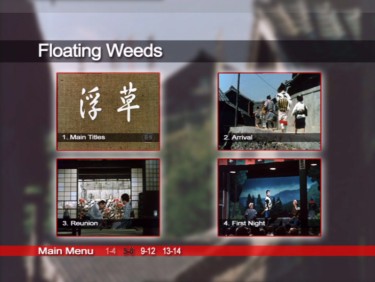 |
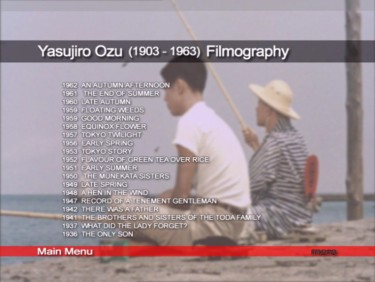 |
 |
Subtitle Sample
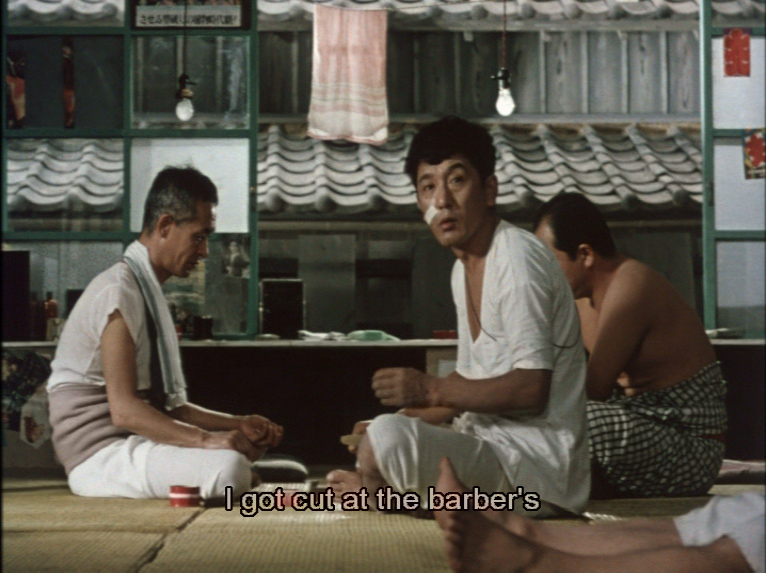 |
Screen Captures
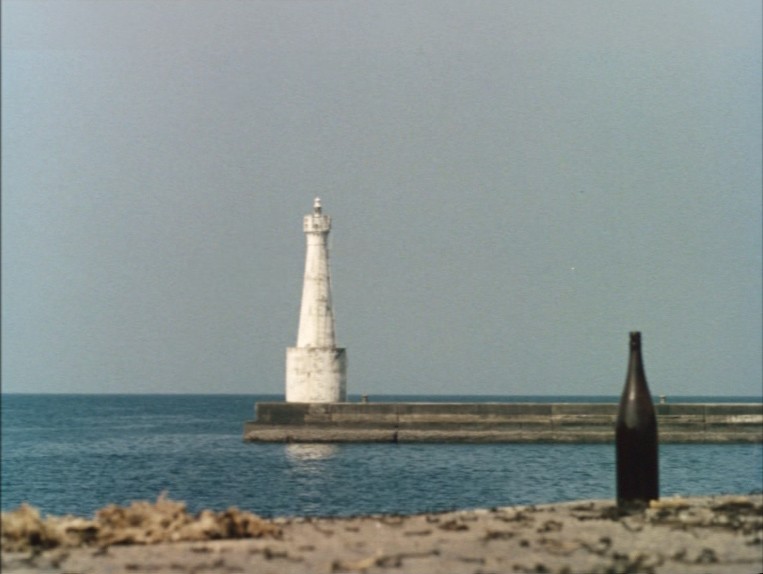 |
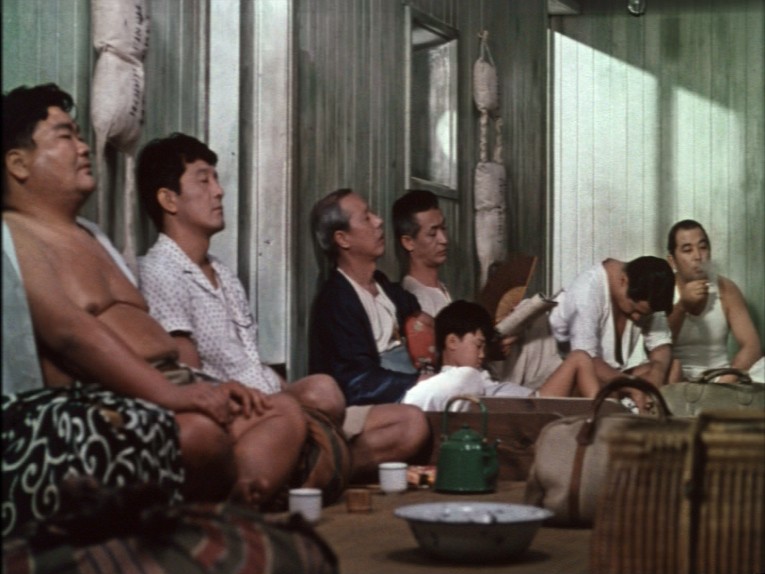 |
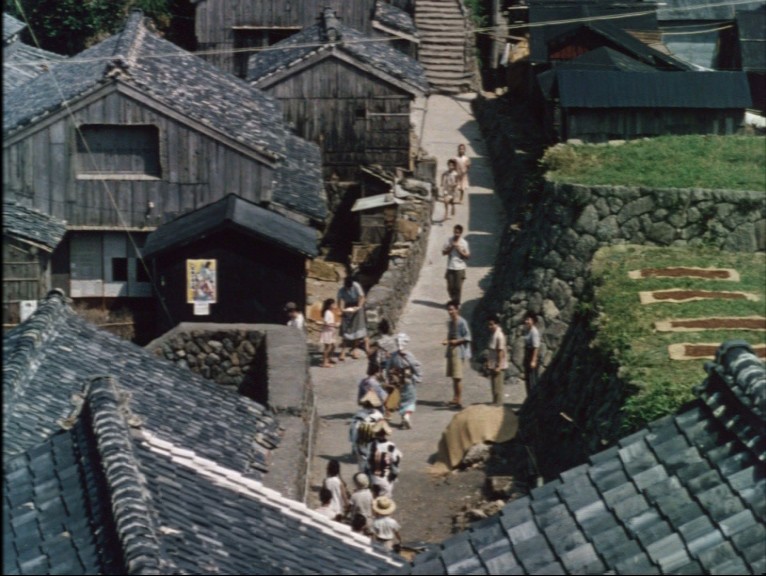 |
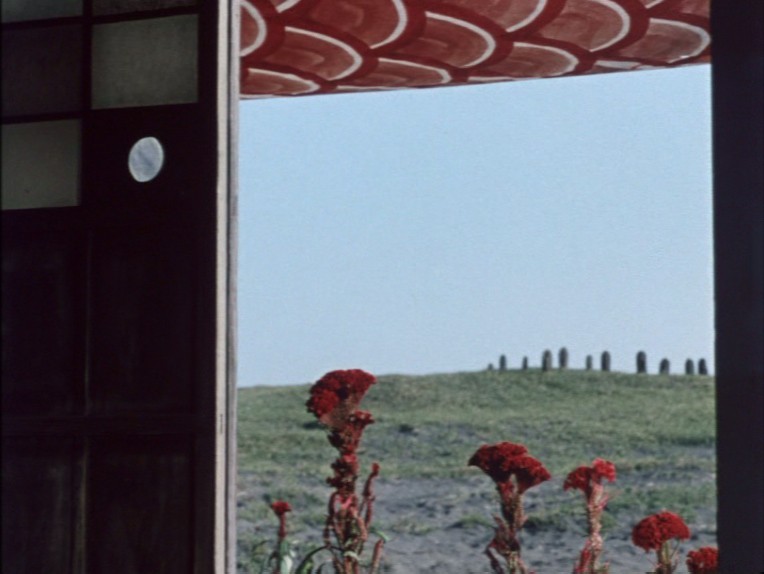 |



